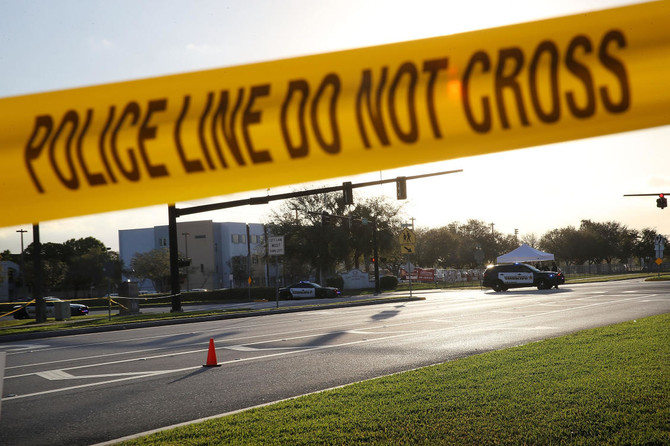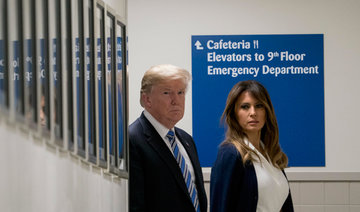FORT LAUDERDALE, United States: US President Donald Trump said Saturday the FBI was so caught up in the Russia probe that it failed to heed signs which could have prevented the Parkland school shooting.
His comments came as he faces criticism from survivors of the attack over his ties to the powerful National Rifle Association, and after several thousand rallied in Florida to demand urgent action on gun control.
“Very sad that the FBI missed all of the many signals sent out by the Florida school shooter. This is not acceptable,” he wrote on Twitter.
“They are spending too much time trying to prove Russian collusion with the Trump campaign — there is no collusion. Get back to the basics and make us all proud!“
US authorities have come under mounting scrutiny for failing to act on a series of warning signs ahead of the massacre at Marjory Stoneman Douglas High School in which 17 people were killed.
The FBI admitted Friday it received a chilling warning in January from a tipster who said the gunman Nikolas Cruz could be planning a mass shooting, but that agents failed to follow up.
But the attack, the 18th school shooting this year alone, has also renewed calls for greater gun control with several survivors leading the charge.
One of them, 18-year-old Emma Gonzalez delivered a fiery address to a crowd of students, parents and residents in Ft. Lauderdale.
“To every politician taking donations from the NRA, shame on you!” she thundered, assailing Trump over the multi-million-dollar support his campaign received from the gun lobby. The crowd chanted in turn: “Shame on you!“
“We are going to be the last mass shooting... We are going to change the law,” she vowed — slamming the fact 19-year-old Cruz was able to legally buy a semi-automatic firearm despite a history of troubling and violent behavior.
“The question on whether or not people should be allowed to own an automatic weapon is not a political one. It is question of life or death and it needs to stop being a question of politics,” Gonzalez told AFP following her speech.
In Washington, the political response has made clear that the powerful NRA pro-gun lobby remains formidable, while Trump himself suggested the root cause of mass shootings was a crisis of mental health — making no mention of gun control.
“If the president wants to come up to me and tell me to my face that it was a terrible tragedy and... how nothing is going to be done about it, I’m going to happily ask him how much money he received from the National Rifle Association,” Gonzalez said in her impassioned address.
“It doesn’t matter because I already know. Thirty million,” she said, citing the sum spent by the NRA to support Trump’s election bid and defeat Hillary Clinton.
She then ran through a list of the pro-gun lobby’s talking points — for example, that “a good guy with a gun stops a bad guy with a gun,” that no law could ever stop a madman intent on killing — answering each argument with “We call BS.”
The young woman’s powerful address immediately went viral, with her name a top trending topic on Twitter.
In addition to the FBI’s missteps, Cruz was also known to local police after his mother repeatedly reported him for violent outbursts, while records obtained by the South Florida Sun Sentinel show authorities investigated Cruz in 2016 after he cut his arms on messaging app Snapchat and threatened to buy a gun.
The newspaper, citing Department of Children and Family Services documents, said the investigation came four days after Cruz turned 18 — legally an adult, and thus able to buy a firearm.
Investigators said there were “some implications” for the teen’s safety, but concluded that his “final level of risk is low as (he) resides with his mother, attends school and receives counseling” as an outpatient at a mental health center, the Sun Sentinel said.
Cruz later passed a background check, allowing him in February 2017 to buy the AR-15 rifle used in the massacre.
Trump spoke by phone Saturday with the Parkland mayor, the county commissioner and the principal of Marjory Stoneman Douglas High School to express his condolences and offer his support.
He then pivoted to politics late Saturday with his allegations against the FBI — though the federal government’s investigation into allegations of Russian interference in the 2016 presidential race and collusion with the Trump campaign has been led by special prosecutor Robert Mueller since last May.
There was no immediate response from the FBI to Trump’s latest allegation.
Mueller’s investigation has so far swept up four members of Trump’s campaign, with two agreeing to work for the probe under a plea deal.
On Thursday Mueller indicted 13 Russians for allegedly running a secret campaign to tilt the vote, but did not accuse any Americans of knowingly participating in that effort.


Trump turns on FBI over school shooting after criticism from survivors
Trump turns on FBI over school shooting after criticism from survivors

Australia to ban citizen from returning to country under rarely-used terror laws
- They were briefly freed on Monday before being turned back by Damascus for holding inadequate paperwork
SYDNEY: Australia said on Wednesday it would temporarily ban one of its citizens held in a Syrian camp from returning to the country, under rarely-used powers aimed at preventing terror activity.
Thirty-four Australians in a northern Syrian facility holding families of suspected Daesh militants are expected to return home after their release was conditionally approved by camp authorities.
They were briefly freed on Monday before being turned back by Damascus for holding inadequate paperwork.
Australia has already said it would not provide any assistance to those held in the camp, and is investigating whether any individuals posed a threat to national security.
“I can confirm that one individual in this cohort has been issued a temporary exclusion order, which was made on advice from security agencies,” Home Affairs Minister Tony Burke said in a statement on Wednesday.
Security agencies have not yet advised that other members of the group meet the legal threshold for a similar ban, he added.
Introduced in 2019, the legislation allows for bans of up to two years for Australian citizens over the age of 14 that the government believes are a security risk.
Prime Minister Anthony Albanese said on Wednesday some members of the cohort, that includes children, had aligned themselves with a “brutal, reactionary ideology and that seeks to undermine and destroy our way of life.”
“It’s unfortunate that children are caught up in this, that’s not their decision, but it’s the decision of their parents or their mother,” he added.
News of the families’ possible return has caused controversy in Australia, where support for the right-wing, anti-immigration One Nation party has surged in recent months.
A poll this week found One Nation’s share of the popular vote at a record high of 26 percent, above the combined support for the traditional center-right coalition currently in opposition.
Thirty-four Australians in a northern Syrian facility holding families of suspected Daesh militants are expected to return home after their release was conditionally approved by camp authorities.
They were briefly freed on Monday before being turned back by Damascus for holding inadequate paperwork.
Australia has already said it would not provide any assistance to those held in the camp, and is investigating whether any individuals posed a threat to national security.
“I can confirm that one individual in this cohort has been issued a temporary exclusion order, which was made on advice from security agencies,” Home Affairs Minister Tony Burke said in a statement on Wednesday.
Security agencies have not yet advised that other members of the group meet the legal threshold for a similar ban, he added.
Introduced in 2019, the legislation allows for bans of up to two years for Australian citizens over the age of 14 that the government believes are a security risk.
Prime Minister Anthony Albanese said on Wednesday some members of the cohort, that includes children, had aligned themselves with a “brutal, reactionary ideology and that seeks to undermine and destroy our way of life.”
“It’s unfortunate that children are caught up in this, that’s not their decision, but it’s the decision of their parents or their mother,” he added.
News of the families’ possible return has caused controversy in Australia, where support for the right-wing, anti-immigration One Nation party has surged in recent months.
A poll this week found One Nation’s share of the popular vote at a record high of 26 percent, above the combined support for the traditional center-right coalition currently in opposition.
© 2026 SAUDI RESEARCH & PUBLISHING COMPANY, All Rights Reserved And subject to Terms of Use Agreement.












